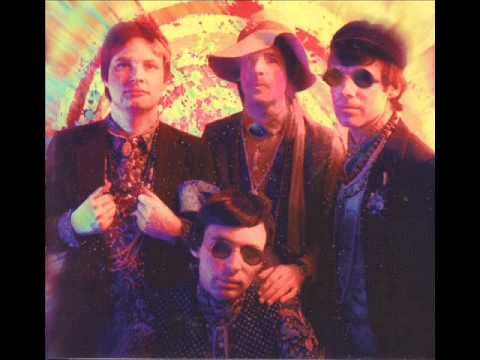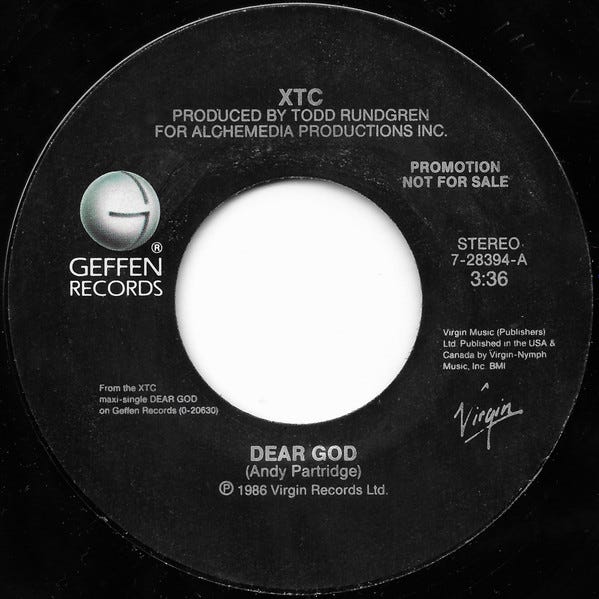Today is the twelfth post in our series about the legendary Todd Rundgren, with only two more posts to come.
We’ve already reviewed his early years, up to and including The Nazz.
We’ve talked about his pop hits — “We Gotta Get You a Woman” (here), “Hello It’s Me,” (here), and “I Saw the Light” (here).
We’ve covered his first major gig as a producer, The Band’s Stage Fright album (here), and the record that appeared to cement his reputation as a hit-maker, We’re an American Band by Grand Funk (Railroad) (here).
Also his involvement in producing Badfinger’s hit singles off their Straight Up album, “Baby Blue” (here), and “Day After Day” (here).
Plus producing the first all-female rock group to release an album on a major label, Fanny (here), rescuing Bat Out of Hell from never making music history here, and doing the Patti Smith Group’s last album here.
Today we have a request from Jeff to cover one more band who worked with Todd as a producer — XTC. Here you go, Jeff!
Song of the day
If you don’t know much about XTC, I recommend reading music journalist, critic, and XTC fan Jeff Mier’s post on “The ecstasy of XTC.” For those of you who are already fans, you might enjoy Brad Kyle’s audio autopsy of the Skylarking album and its influences, including its relation to the band’s work as The Dukes of Stratosphear (below) .
Unusually, Todd covered his work with XTC in two chapters of his autobiography, The Individualist, most likely because there was some controversy surrounding that particular album, Skylarking, following its release in October 1986. Writing about it no doubt afforded him the opportunity to reflect on the experience from the position of an additional 32 years in the business, and also to communicate his interpretation of what occurred from his perspective as the album’s producer.
When Todd got the call in early 1986 asking him to consider producing XTC’s next album, he immediately accepted as he was already a fan of their “smart pop music,” but also “girded [his] loins” as he was aware of the band’s history of wresting control from producers and knew it was going to be a challenge. Calling the label’s A&R guy, he was informed that this was the band’s last chance — produce a successful album or be dropped from the label — as their records had been selling less and less. Todd then spoke to XTC guitarist and assumed leader Andy Partridge, who told him that they had a bunch of about 30 songs that Andy and bass guitarist Colin Moulding had written, but as yet had no concept or direction for the album. Todd requested that they send him everything and found there was a considerable amount of material to consider.
This is where it gets interesting, and where we see a producer at work. “I decided I would try to apply Francis [Ford Coppola]’s progressive refinement technique and began to find photographs that represented each song. For instance, I found a picture of a riotous English garden with its haphazard plantings of pink and purple blooms which became the visual template for Drowning in Summer’s Cauldron. We made the song sound like the picture looked, fleshing it out with natural noises in subtle sync, bird twitters and dog barks in rhythm. Every song had an image, a dark factory, a sunny beach, a sacrifical bonfire. The running order was a song cycle, morning to evening, January to December, birth to death.”
The song “Another Satellite” was the anomaly. According to Todd, “Despite our agreement to abide by my concept, something perverse in Andy caused him to challenge it. We rerecorded a demo called Another Satellite, not because it fit into the song cycle but to simply mollify and humor Andy… something that in the end only satisfied Andy and otherwise stuck out like a sore turd in an otherwise near-perfect listening experience.”
Here’s Todd discussing the experience of working with the band on Jonesy’s Jukebox, a radio show hosted by the guitarist of the Sex Pistols Steve Jones (or you can continue reading and get the gist below).
Todd has a theory about why XTC’s records were selling less over time. When the band stopped touring because Andy got stage fright, their musical life was then happening only in the studio, resulting in two problems. The first was that they didn’t want recording to end as it meant the music-making would stop (since they weren’t touring), and the other was that they would get consumed with the process of mixing. With all the tinkering and filling in every available space with sound, the songs lost their dynamics as they became flat from too much content, making them an exhausting experience for the listener.
Todd had declared to the band at the start that he was going to be there for the entire record (i.e., he wouldn’t walk out or be pushed aside). He and the band gathered and laid down the tracks at his Utopia Sound Studios in Woodstock, and then moved to the Sound Hole Studios in San Francisco to overdub the drums, strings, and other instruments and sounds.
Overall, Todd considered the band “amazing musicians,” in particular Dave Gregory. Dave did the string arrangements for “1000 Umbrellas” (as well as “Dear God”), Todd considering it “a major feat” and later getting string arrangement requests because people assumed he was the one who’d done it. It was also the first album on which Dave sang with what Todd called his breathy and perfectly in tune voice.
Todd also notes in his autobiography that they decided to take a crack at a live performance on “Earn Enough for Us,” “the only song on the entire album when the band all played together. Suddenly we all got a glimpse of XTC before Andy’s stage fright, jangly and rollicking and everyone was euphoric after we captured it in less than 5 takes.” The next morning Todd came into the studio to find Andy “making Colin punch in every other phrase” on that song, with Todd offering “that there was nothing wrong with the live performance, arguing it represented a rare glimpse of the band in the raw. Andy, with his usual flair for language, offered that he would like to cleave my head with an axe,” following which Colin claimed he was done with the record and band and stormed out.
Despite the brouhaha, they all returned to Woodstock to do the mixing, and much to Todd’s surprise, after completing just two songs, the band said they were going back to England and left him to finish. He took it as both a blessing, as he could finish the mixing within a week or so, and a curse as it meant that Andy had abandoned the album. In fact, Andy referred to it as XTC’s worst album before it even came out.
Andy and the band’s UK label, Virgin Records, were both concerned about “Dear God” (above), Andy expecting protests at his house and Virgin not liking children’s voices on the record. Virgin took it off the album, putting it on the B side of “Grass,” but had to hustle to put it back on when it turned out to be the song that took off.
With all the turmoil around the making and release of the album, you might be left with the impression that Andy abhorred working with Todd and hated the album. At least for me, that impression was destroyed when I listened to the promotional interview (for radio stations) below on the Warner Brothers Music Show, in which Andy enthusiastically reviewed each song and talked about Todd’s influence. He was clearly very proud of the songs — rightly so — and appears to have relished the musical collaboration with Todd.
Skylarking was, indeed, a success for the band, with Rolling Stone magazine listing it at #48 and Pitchfork Media putting it at #15 on their respective lists of the Top 100 Albums of the 1980s. The album would chart at #70 on the US Billboard 200 for the year, and the band would not be dropped from their labels and would go on to make more albums.
(Sidenote: XTC is, unfortunately, another band that went into debt as a result of poor management, receiving no profits from record sales or tours, a contributing factor in the band’s demise despite having an avid and loyal fan base. This is a running theme in my research on these artists and bands that I will be exploring in paid posts.)
Let’s listen to one of the singles from Skylarking that, according to Andy, is about “lust amongst the rust” and places where lovers can go to frolic. Despite an odd beginning, I love this song and video, showing the band’s whimsy and signature sense of humor:
Album and song credits
Songwriters - Andy Partidge, Colin Moulding (including “The Meeting Place”)
Producer/engineer - Todd Rundgren
XTC:
Andy Partridge – vocals, guitar
Colin Moulding – vocals, bass guitar (also credited with "bonfire")
Dave Gregory – vocals, guitar, piano, synthesizers, Chamberlin, string arrangement on “1000 Umbrellas” and “Dear God,” tiple
Additional personnel and technical staff:
Todd Rundgren – melodica, synthesizers, backing vocals, orchestral arrangements, computer programming
Prairie Prince – drums
Mingo Lewis – percussion
Jasmine Veillette – vocals on “Dear God”
Kim Foscato – assistant engineer
George Cowan – assistant engineer
Dave Dragon – sleeve drawings
Cindy Palmano – photography
Ken Ansell – typography
Orchestral players:
John Tenney – violin
Emily Van Valkenburgh – violin
Rebecca Sebring – viola
Teresa Adams – cello
Charlie McCarthy – alto and tenor saxophones, flute
Bob Ferreira – tenor saxophone, piccolo flute, bass clarinet
Dave Bendigkeit – trumpet
Dean Hubbard – trombone








Please give me 10 minutes with Todd Rundgren. I know it wouldn't tank, it would only be bad day him bad day me or good day him good day me or anything in between. We'd have hay to hoe. No doubt.
Thanks, Ellen, for the mention of my Audio Autopsy of "Season Cycle"! And, thanks for helpfully and creatively filling in some gaps in my musical vacuum! I was in my "pop culture black hole" in '86, just finishing my return-to-college at 31 to effect a career change! It wasn't at the time, but I learned, some time later about Todd (whom I'd met a decade before) produced this XTC album.
In fact, one of my first youth night Bible studies with my newly-assigned church (I had just earned my B.A. with certification, as a Director of Christian Ed in a Lutheran church in southern L.A. county) was a look and listen to "Dear God," which of course, I noticed was produced by Todd!
By this time, my high school-age charges were well aware (and impressed.....for some reason!) of my '70s/early-'80s time in radio and the record biz, and were anxious to see, in essence, a deep dive into a topic (namely a rock song) that had some "real world" relevance from someone who'd had one foot in the rock world they loved, but could, now, "marry," the two seemingly divergent POVs!
Many's the time, in the 4 years I was at that church, I would tote a carload of those lads to Disneyland, Magic Mountain, Knott's Berry Farm, and wherever, and shove a cassette of Genesis, Jethro Tull, and many other classic rockers into the car's player, and they've now, all grown, married, and had kids who've, of course, heard those same sounds, as Dads have passed them on to their kiddos!!
As for Todd and Andy P., and Todd and The Dolls (to pick 2 I'm aware of)....Todd, if not a task-master, is a strong personality in the studio (as we've seen from your excellent series), and that can bring resentment, if not hatred, from strong-willed members of whichever acts with whom he's working. The same animus that The Dolls' Sylvain had in '73, seems similar to Andy P's over a decade later! Then, in the rear-view mirror of time (after sales figures have been published, and critics have weighed in), both have mellowed in their opinions of the experience!
The Dolls went from "My grandmother could do a better job!" to "He accurately captured our live sound" in the span of just a few years! Andy, as we've heard, back-pedaled from his earlier rancor! Ah, artists!😁